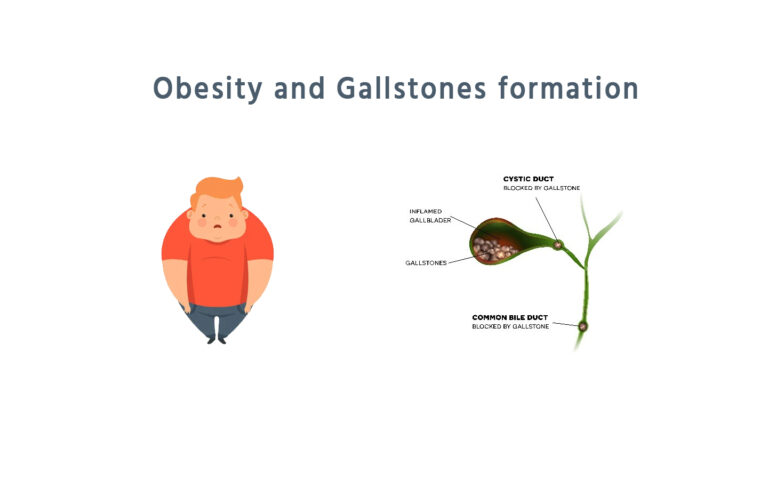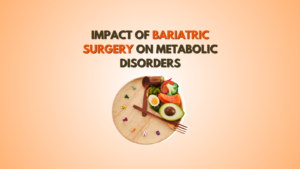Obesity and Gallstones formation - Aastha Bariatrics

Obesity is a disease that causes so many other diseases and one of the diseases is gallstone formation in gallbladder (Cholelithiasis). People with higher BMI are at a higher risk of developing gallstones.
Obesity increases your chances of developing gallstones
Gall bladder is a small organ that is located in the upper right part of the abdomen, just below the liver. The function of gallbladder is to store bile. Bile is a fluid which is produced by the liver for the breakdown of fat which is used for energy.
Gallstones are made of cholesterol and formed when bile, which aids in the digestion of fat that contains too much of cholesterol and bilirubin and less of bile acids or lecithin.
Gallstones are so small that they are barely visible. They occur singly or in hundreds and can be asymptomatic or painful.
Excess body weight makes it more difficult for the gallbladder to empty and this allows cholesterol rich bile to accumulate and harden into stones.
Causes of gallstone formation
- Cholesterol plays a major role in the formation of gallstone. So, it is recommended to cut down on foods which contain high saturated fat content like butter, cheese, biscuits, etc.
- Bile saturation may cause gallstone formation and the risk may increase with increasing age.
- Gallstone formations are more common in women than in men. During pregnancy serum estrogen increases which enhance the cholesterol saturation which causes increased progesterone, which leads to inhibition of the contraction of gallbladder,
- Poor lifestyle such as smoking, alcohol, medications are also the causes which play an important role in increasing obesity and enhancing the risk of gallstones formation.
All the causes which play an important role in increasing obesity also enhance the risk of gallstones formation.
The chances of gallstones formation in humans may increase due to obesity. And this increases the risk in people who have higher BMI. So, it is important to check different factors which increase the weight and in turn increase the risk of gallstones formation in gallbladder
Detection of gallbladder disease
Gallbladder disease is indicated by the presence of gallstones. Which is detected with ultrasound.
Periodic discomfort is the most typical symptom of gallstones and develops when gallstones obstruct the gallbladder’s exit. This persistent ache is typical of a gallbladder attack.
The discomfort is felt right under the breast bone in a location known as epigastrum, also known as the pit of the stomach. The discomfort frequently shifts to the back and is accompanied by nausea and vomiting. This complication of the gallbladder disease is known as cholecystitis.
Prevention and treatment of gallbladder disease
As mentioned previously, obesity is one of the major risk factors for gallbladder disease, therefore many patients are advised to have their gallbladders removed prior to the treatment for obesity.
Patients who do not undergo a cholecystectomy may develop symptomatic gallstones after a period of rapid weight loss.
To prevent cholecystitis and other complications of gallbladder disease, early and prompt removal of the gallbladder is recommended as soon as symptoms develop. Development of symptoms indicates progressive active gallbladder disease and the need to consider surgery.
How to lose weight safely to reduce your gallstones?
Modest weight loss not only helps prevent gallstones , it also encourages new habits that help to losing and regaining weight repeatedly. Control of body weight may help prevent the development of gallstones.
Healthy lifestyle helps in controlling obesity and reduces the risk of gallstones. A diet which is low in fat and high in fiber may help in lowering the risk of gallstone formation.
Gallstones can lead to the development of acute pancreatitis. Patients who suffer from obesity and develop acute pancreatitis have increased severity of the disease.
Obesity and Gallbladder Disease
However, many patients have their gallbladders removed during a bariatric procedure if symptomatic gallstones or gallbladder disease is found. Bariatric surgery patients should follow their surgeon’s postoperative dietary and exercise plan to lose weight in a measured manner and reduce the likelihood of gallstones. Staying well hydrated, eating a balanced diet according to the dietary plan and losing weight moderately and regularly is key to keeping gallstones at bay after bariatric surgery.
Obese patients who have their gallbladder removed due to underlying disease and not as part of a bariatric procedure, may experience a higher operative risk. Those carrying excess weight increased their risk of perioperative and postoperative complications significantly.
As with other organs and disease states, obesity seems to not only increase the likelihood of developing the condition or disease, but also seems to worsen these symptoms and effects. 1 It also can reduce the safety and effectiveness of the solution – in this case, surgery.
The surgery to treat gallbladder disease by removal of the gallbladder is known as a cholecystectomy.
Therefore, gallbladder disease is an important issue for a patient with obesity.
Why We Are?
- Asia's Trusted Bariatric Center
- Centre of Excellence
- Patient Trusted Highly Volume Bariatric Center in Mumbai
- EMI, Cashless & Mediclaim Facilities are Available
- Daily Patients Follow-up after Bariatric Surgery
- Patient Support Group Every Month
- Obesity Awareness Program
- Available with Latest Technologies
- 18+ Experience in Weight Loss Bariatric Surgery
- 300+ Weight Loss Diet Plan & Recipes
- Highly Trained & Experienced Bariatric Nutritionist
- Patient WhatsApp Chat Group
- & Many More
Medically reviewed by Dr. Manish Motwani, Bariatric & Metabolic Laparoscopic Bariatric Surgeon — Curated by Vidhi Jain







